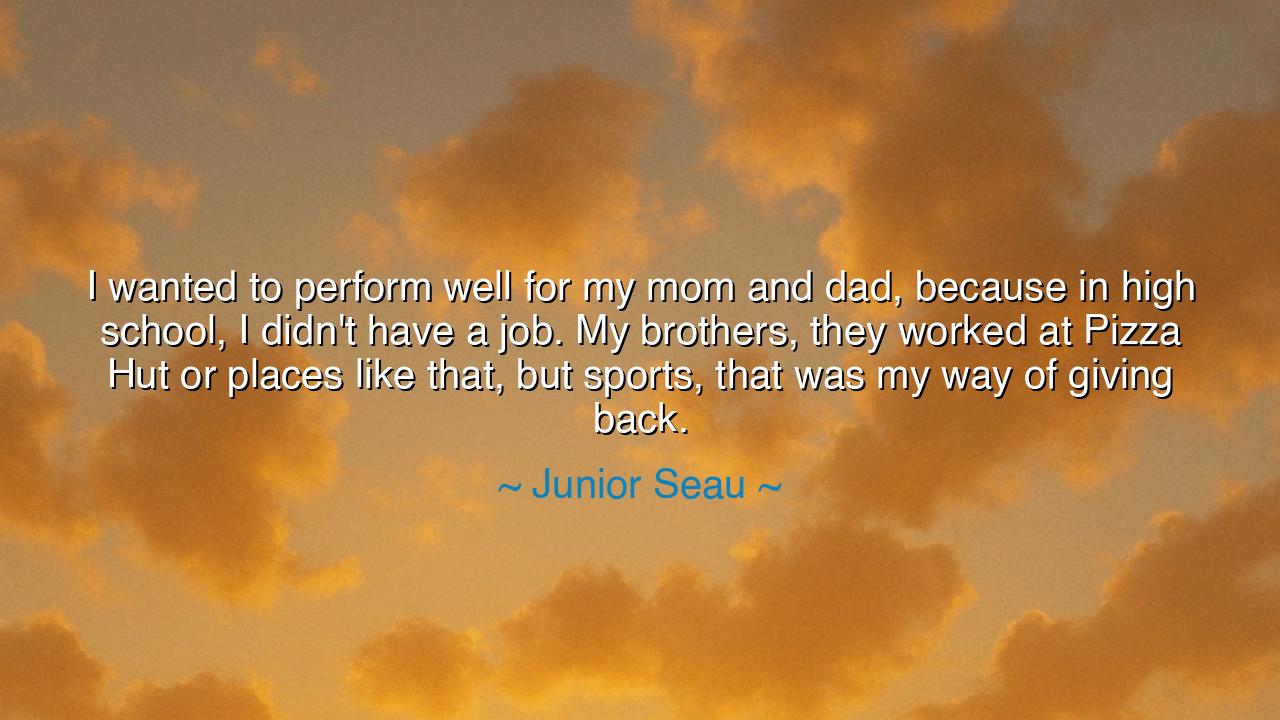
I wanted to perform well for my mom and dad, because in high
I wanted to perform well for my mom and dad, because in high school, I didn't have a job. My brothers, they worked at Pizza Hut or places like that, but sports, that was my way of giving back.






The words of Junior Seau, “I wanted to perform well for my mom and dad, because in high school, I didn’t have a job. My brothers, they worked at Pizza Hut or places like that, but sports, that was my way of giving back,” reveal to us the noble spirit of gratitude and sacrifice. In them we hear not only the voice of a great athlete, but of a son who understood that every gift he possessed was rooted in the labor and love of his parents. To him, the field of sport was not merely a stage for glory, but an altar of offering, where each tackle, each sprint, each triumph was dedicated to his family.
The origin of this sentiment lies in the humble soil from which many heroes rise. Junior Seau, like countless children of immigrant and working-class households, was shaped by the sight of parents who gave much and asked little. While his brothers earned wages in restaurants and shops, he chose another path—one not measured in dollars but in effort, one where excellence itself became his currency. His performance on the field was not for vanity, but for love; every cheer from the crowd was, in his heart, a way of saying, Thank you, Mom and Dad, for every sacrifice you made for me.
This truth echoes across the ages. Consider the story of Cincinnatus, the Roman farmer called from his plow to save the Republic. He did not seek wealth or title; he returned to his fields after victory, for service was his gift to his people. So too did Seau see his athletic prowess not as his alone, but as something to be used in service to those who had raised him. The soil of his parents’ sacrifice bore fruit in the form of his dedication, just as the soil of Cincinnatus’ farm bore grain for his household and Rome alike.
There is deep wisdom here. The world often teaches us to chase success for ourselves—fame, wealth, the lifting up of the self above all others. But Seau’s words remind us that the truest motivation is born from love. When we strive not only for ourselves but for those who gave us life, who guided us, who sacrificed quietly in the background, then our efforts are magnified. The body grows stronger, the spirit steadier, the will unbreakable. For what man would not endure pain and hardship when he knows that in doing so he honors his family?
The lesson, then, is this: never forget the hands that lifted you when you were small, the voices that encouraged you when you faltered, the sacrifices unseen that allowed you to dream. Whether your parents, your mentors, your siblings, or your community, let your work become your way of giving back. You may not always have money to repay them, but you have effort, you have diligence, you have the power to dedicate your excellence as a living offering of gratitude.
Practically, this means that each of us must weave gratitude into our daily striving. Work not only for the paycheck, but for the pride it brings to those who believe in you. Study not only for grades, but for the joy it brings to those who sacrificed so you might learn. Compete not only for victory, but to reflect the honor of those who shaped you. In this way, every action becomes a form of repayment, and the cycle of love and sacrifice continues unbroken.
So, beloved listener, remember Junior Seau’s words when your path feels heavy. When fatigue whispers, when doubt clouds your mind, recall the faces of those who carried you before you could walk. Let their memory be your fire, as it was his. For true greatness is not found in selfish triumph, but in giving back—through your talents, your discipline, and your heart. In this, you will find not only strength for yourself, but honor for all who made you who you are.






AAdministratorAdministrator
Welcome, honored guests. Please leave a comment, we will respond soon